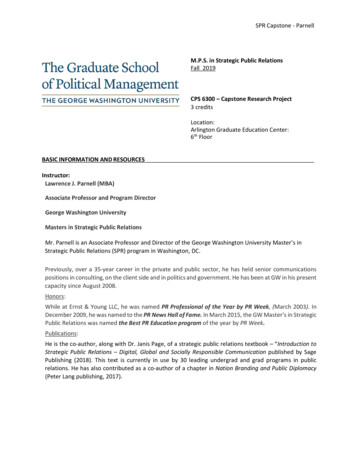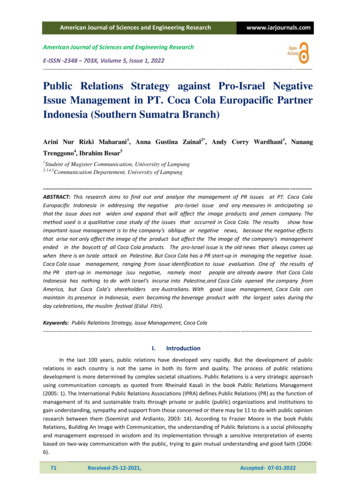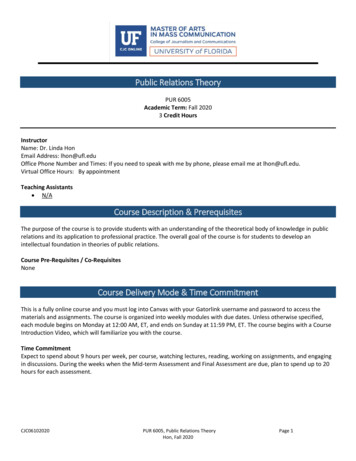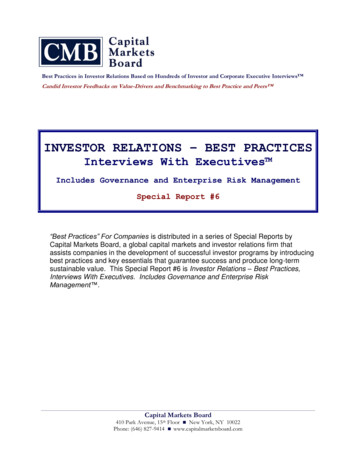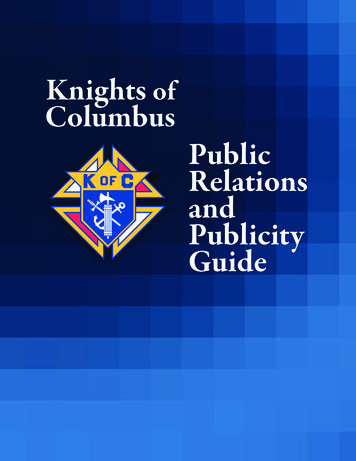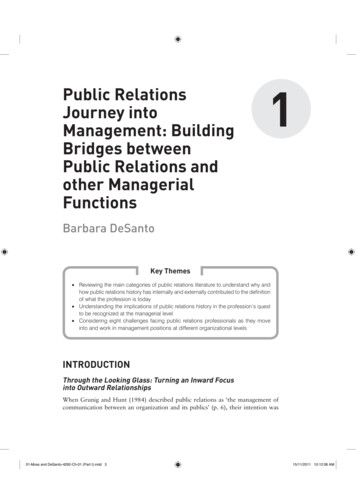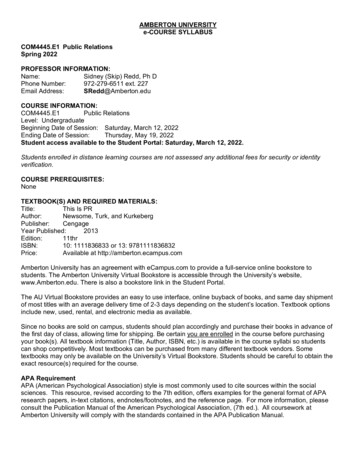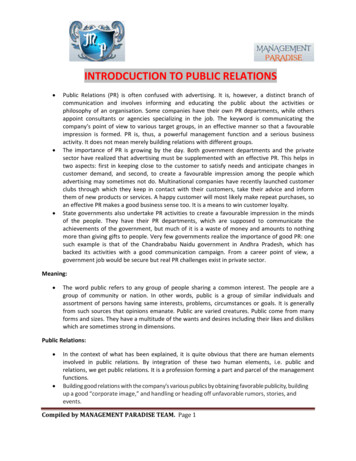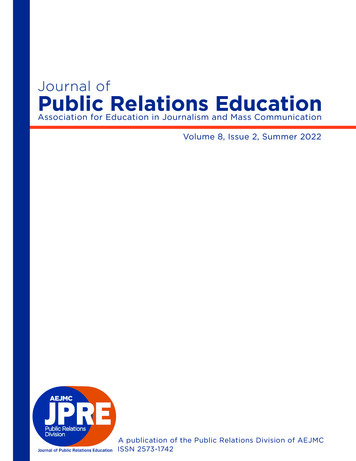
Transcription
PR 250: Strategic Public Relations: An IntroductionNumber of Units: 4Fall 2016—Mondays—6:00pm – 9:20pmSection: 21184Location: ANN 211.Textbook: Public Relations: Strategies and Tactics, Updated 11thedition, Wilcox, Cameron, 2016Instructor: Gregory BishopOffice: prior coordination requiredOffice Hours: Mondays 5:00-6:00pmContact Info: greg@musa-media.com, gbishop@usc.eduPhone: 931-561-5219 (call or text)I. Course DescriptionStrategies and practices in the growing field of public relations/strategic communication, including landmarkcases, special emphasis on historical roots, evolution, current and future practice. This course is designed togive students a broad understanding of the field of Public Relations and help them determine if it is acareer field they may endeavor to pursue.II. Overall Learning Objectives and AssessmentThis course is designed to introduce you to public relations as a professional practice. How is publicrelations defined? What disciplines make up the public relations profession? What are the tenets of thepublic relations field? Where might you fit in? How is public relations practiced here and abroad; in acorporation and in an agency; in government, in politics and in the non-profit sector?Public relations mean different things to different people. We will define what it means to be a publicrelations professional, how you learn the public relations craft and how you develop and hone your publicrelations skills. We will cover the basic process of public relations research, planning, communication,evaluation and the use of communications strategies to achieve organizational goals.Through lectures, reading, practical exercises, guest speakers, research, writing, teamwork and individualeffort, we will explore the world of PR.COURSE OUTCOMES:Upon completion of Journalism 250, Strategic Public Relations, An Introduction, students can expect Akeen understanding of how public relations is defined and practiced - by career, by discipline, and bypersonal interest.1. A strongly developed awareness of the myriad of specialized choices that exist for a publicrelations professional.2. A foundation for comprehending why and how public relations is employed by nearly everyone.3. A practical knowledge of the rationale for, and process to achieve, sophisticated, disciplinedplanning.4. A basic understanding of the profession sufficient to succeed in USC Annenberg’s undergraduatePublic Relations Studies program.
III. Description of AssignmentsMy grading system is merit based. Your grades will be determined by comparing your work to the overalllevel of performance among your fellow students. The best work will achieve the highest grades, and thosewho don’t perform as well as their peers will receive the lowest grades. The assignments you will beresponsible for are quizzes, a group case presentation project, a mid-term exam, a term paper, a finalindividual project, and your individual class participation.IV. Gradinga. Breakdown of Grade. Course grading is based on the 400-point system outlined below. There will be atotal of 9 quizzes, 7 of which will be worth 1pt each and 2 quizzes will be worth 1.5pts each, for a total of 10points.AssignmentQuizzesCase Presentation (group project)Mid---Term examTerm PaperFinal ProjectParticipationTOTALPoints4060808010040400% of Grade101520202510100%b. Grading Scale97 to 100: A 83 to less than 87: B70 to less than 73: C-93 to less than 97: A80 to less than 83: B-65 to less than 70: D90 to less than 93: A-77 to less than 80: C 60 to less than 65: D-87 to less than 90: B 73 to less than 77: C0 to less than 60: Fc. Grading StandardsI do not apply a rigid application of arbitrary percentages in the distribution of grades (i.e., only giving A’s orB’s to a certain percentage of the class). You will receive the grade you deserve based on the quality of thework you submit relative to the rest of your peers.I give a quiz nearly every class session. Quizzes are solely based on the reading assignments. READ ANDSTUDY YOUR BOOK. I do not require memorized definitions of terms, rather you need to demonstrate youhave a grasp of the concept and are able to articulate the meaning clearly and in your own words.Attendance, participation, and READING your text are critical to success in this class. The differencebetween a solid letter grade, or a “-“ or “ ” could be missing one day of class.The following will give you an idea on my thinking when it comes to grading:“A” grades have writing near professional quality; one or no mistakes; clearly proofread and editedmaterial, professionally organized. You follow instructions that we cover in class. Excellent organization andflow; original and creative thinking. You clearly demonstrate the concepts and ideas that we discuss in classand thoroughly follow the planning model. You show creativity in packaging/distribution methods. High endof scale: professionally presentable today as is.“B” projects have two to five spelling, grammar or AP Style mistakes and show potential as a good writer.You follow most of the instructions we cover in class. High end of scale will have at least one extraordinary
element such as astonishingly creative idea or strategy. Some creativity shown. Publishable with mediumediting. You demonstrate a general understanding of the ideas we discuss in class.“C” projects have more than five errors (spelling, grammar, AP style). Poorly edited and/or proofread.Hackneyed elements such as trite strategies and tactics. Little or no facts/figures included. Little or nocreativity shown. You don’t follow the planning model or you improperly apply concepts that we discussedin class.“D” projects have more than 10 errors (spelling, grammar). Needs to be completely rewritten. Poorlyorganized with little or no understanding of the concepts we covered in class. Needs to work with writingcoach.“F” projects are not rewritable, late or not turned in.Participation in Class Discussion CCEPTABLE0-.25FrequencyFrequent contributionto class discussion.Regular contribution toclass discussionSeldom or nocontribution to classdiscussionRelevanceContributions to classdirectly address keyissues, questions, orproblems related tothe text and thediscussion activity.Contributions to classaddress key issues,questions, or problemsrelated to the text andthe discussion activity,but in some cases only.Contributions to class donot directly address thequestion or problemposed by the discussionactivities.InsightContributions to classoffer original orthoughtful insights,analyses, orobservations thatdemonstrate a stronggrasps of concepts andideas pertaining to thediscussion topics.Contributions to classoffer some insight,analysis, or observationto the topic but may notdemonstrate a fullunderstanding orknowledge of conceptsand ideas pertaining tothe discussion topics.Contributions to class donot offer any significantinsight, analysis, orobservation related to thetopic. No knowledge orunderstanding isdemonstrated regardingconcepts and ideaspertaining to the discussiontopics.SupportContributions to classsupport all claims andopinions with eitherrational argument orevidence.Contributions to classgenerally support claimsand opinions withevidence or argument,but may leave somegaps whereunsupported opinionsstill appear.Contributions to class donot support their claimswith either evidence orargument. Thecontributions containlargely unsupportedopinion.
Final Group Project GradingCriteria Group produces sound, thought-provoking analysis grounded in research ona singular organizational area of interest.Thoroughly examines all pertinent aspects of a givenorganization with a singular, clear purpose.Formulates innovative, valid conclusions grounded in sound empiricalevidence.Effectively delivers engaging, informative multimediapresentation on research findings.Provides defensible implementation plan for the organization, includingthemes, messages, channels, sources etc.Optimally structures and organizes content in written product andpresentation.Delivers professional quality paper and presentation, withoutgrammatical errors, typos, etc.Accurately cites all source material in accordance with APA stylestandards.Meets all posted deadlines for project deliverables.Group produces sound, interesting analysis grounded in research ona singular organizational area of interest.Examines all pertinent aspects of a given organization with a singular,clear purpose.Formulates innovative conclusions grounded in sound empirical evidence.Delivers engaging, informative multimedia presentation on researchfindings.Effectively structures and organizes content in the written productand the multimedia presentation.Delivers professional quality paper and presentation, withoutgrammatical errors, typos, etc. Accurately cites all source material in accordance with APA style standards.Meets all posted deadlines for project deliverables. Group produces interesting analysis grounded in research on a singularorganizational area of interest.Examines some pertinent aspects of a given organization without identifying asingular, clear purpose.Paper/presentation lacks in the professional quality and standards expectedof today’s PR professionals. V. Assignment Submission PolicyA.B.PointsExemplary54-60 ptsSatisfactory48-53 ptsUnacceptable0-47 ptsAll assignments are due on the dates specified at the BEGINNING OF CLASS. I WILL accept earlyassignments, but I WILL NOT accept late assignments. Late assignments will automatically be givena grade of 0/F.Assignments must be submitted on paper. I will accept an email copy to meet the deadline, but I do mygrading on your documents, so you must follow-up with a hard copy.
VI. . Required Readings and Supplementary MaterialsBesides reading and studying your reading for each quiz, you must keep up with current events. 2016 is animportant election year, so keeping up with the political landscape (foreign and domestic affairs) isimportant.VII. Laptop PolicyAll undergraduate and graduate Annenberg majors and minors are required to have a PC or Apple laptopthat can be used in Annenberg classes. Please refer to the Annenberg Virtual Commons for moreinformation. To connect to USC’s Secure Wireless network, please visit USC’s Information TechnologyServices website.VIII. Course Schedule: A Weekly BreakdownImportant note to students: Be advised that this syllabus is subject to change – and probably will change –based on the progress of the class, news events, and/or guest speaker availability.
Topics/Daily ActivitiesReadings and HomeworkDeliverable/ Due DatesWELCOME TO THE WORLD OFJ-250Housekeeping- Syllabus review- Policies and proceduresPublic Relations- What is it?- Misconceptions about publicrelations- What might your role be?WELCOME TO THE WORLD OFPUBLIC RELATIONS- The history of PR – how it gotstarted; how it has evolved- The functions of PR- The model of public relations- Term paper -- What you needto knowNoneQuiz: NONEParticipation: 1ptRead preface and Chapters 1 and2Quiz 1: 1ptParticipation: 1ptLabor Day– Have a safe holiday weekendWHERE DOES PR FIT IN ANORGANIZATION and ETHICSAND LAW- PR Departments, agencies,boutique firms, consultants,etc., etc., etc.- Ethics in PR really? Yes,Really.- PR and the Law this lecturewill save your careerCOMMUNICATION AND THEART OF PERSUASION- Communication – a publicrelations perspective- What is public opinion andhow can PR influence orpersuade it- Term paper proposalsHOW DO YOU BEGIN TO “DOPR?”- Planning: the value of acommunications plan; how tocreate one; why create one.- Research: Sorry there’s mathin PR too! Why is it important;how is it done; how to use it- Group PresentationAssignmentsRead chapters 3, 4 and 12Quiz 2: 1ptParticipation: 1ptRead Chapters 7 and 9Quiz 3: 1ptParticipation: 1ptRead Chapters 5 and 6Quiz 4: 1ptParticipation: 1ptClass 7Oct 3MID-TERM EXAMINATIONStudy for the mid-termNoneClass 8Oct 10THE WHO, THE WHAT AND THEWHY – AUDIENCE ANALYSIS,STORYTELLING AND1. Read Chapters 11 and 142. TERM PAPER PROPOSALS DUETODAY.Quiz 5: 1.5ptsParticipation: 1ptClass 1Aug 22Class 2Aug 29Class 3HOLIDAYSEP 5Class 4Sep 12Class 5Sep 19Class 6Sep 26
THE WHO, THE WHAT AND THEWHY – AUDIENCE ANALYSIS,STORYTELLING ANDSTRATEGIES- Defining your audience- Targeting your message- What’s a press release, mediaalert, pitch, etc.MORE STRATEGIES ANDTACTICS- The art of the presentation.- How to use Radio and TV intoday’s media environment.- What’s a press conferenceand how do you conduct one?- Mid-term exam review1. Read Chapters 11 and 142. TERM PAPER PROPOSALS DUETODAY.Quiz 5: 1.5ptsParticipation: 1pt1.Read Chapters 15 and 16Quiz 6: 1.5ptsParticipation: 1ptClass 10Oct 24NEW TECHNOLOGIES ANDEVALUATION- Social media as a PR Tool?- Evaluation? Yes, there’s mathin PR .sorry.1. Continue Case Study work2. Read Chapters 13 and 8.Quiz 7: 1ptParticipation: 1ptClass 11Oct 31Class 12Nov 7GROUP CASE PRESENTATIONSCRISIS COMMUNICATIONSAND PR IN CORPORATIONS- What to do when your worstcase scenario comes true.Read Chapters 10 and 17.Quiz 8: 1ptParticipation: 1ptClass 13Nov 14POLITICS, GOVERNMENT ANDNON-PROFIT ORGANIZATIONS- Learn from politicians andtheir PR machines.- Government Public Affairs.ENTERTAINMENT, SPORTS PR- Is it as fun as it sounds?- What are your careeroptions?- Final Project Assignments.FINAL REVIEW DAYRead Chapters 19 and 21.Quiz 9: 1ptParticipation: 1pt*** TERM PAPERS DUE TODAY***Quiz: No QuizClass 8Oct 10Class 9Oct 17Class 14Nov 21Class 15Nov 28NO CLASSDec 5FINALDec 12*7PMSTUDY DAYS- Term papers handed back.Quiz: No QuizHAVE A GREAT, SAFE WEEKEND- Final projects due at thebeginning of classIX. Policies and ProcedureAdditional PoliciesWHAT I EXPECT FROM YOU:1. Class starts at 6:30 p.m. SHARP. I am a former U.S. Army Lieutenant Colonel self-discipline andprofessionalism are important in school and in life tardiness and absences will be detrimental to your grade.You do not need to request permission to miss class, leave early or come late. You’re an adult. I leavethose decisions to you. We meet once a week; missing class will leave a significant gap in your learning so Isuggest you find a “battle buddy” to share notes, assignments and handouts from any missed classes.2. I plan to give you a quiz in nearly EVERY CLASS SESSION. Quizzes will only cover your readingassignments. READ THE BOOK. If you are late and a quiz is in progress, you cannot take it. If you areabsent, there are no make---ups.
3. Assignments are due to me at the beginning of class in hard copy, or via email. I WILL NOT accept latehomework. If you forget your homework, it is late; if you email it to me and the time stamp on the emailsays 6:31 or later, you are late. All assignments will be complete, double-spaced and typed, with nohandwritten edits.4. If you are absent, you are responsible for getting notes and assignments from a fellow student. I do notrecap or e-mail assignments or notes if you have missed class.5. Class participation is expected and impacts your final grade. Everyone is expected to contribute. If you’reshy and you don’t want to speak in front of others, you’re in the wrong business.6. There should only be one discussion going on at a time in class. Paying attention to the speaker, whetherit is the instructor, fellow student or guest is a sign of respect and professionalism. Unprofessional behaviorwill not be tolerated.7. Do not use your computers during class for anything but class-assigned work or note taking.8. Cell phones will be turned off and IGNORED during class. No texting during class.9. There will be no make-ups for the mid-term. There will be no extensions for the term paper or finalproject. You must complete the mid-term, term paper and final project to pass the class.10. COMPLETE YOUR READING ASSIGNMENTS!! DON’T FALL BEHIND.WHAT YOU CAN EXPECT FROM ME:Now, let me help you relax 1. I take the teaching of this course seriously and I enjoy the interaction with students. I will come eachweek with the goal of helping you prepare for the world and for the world of public relations. My hope is tomake this class interesting, fun, worthwhile and something to which you look forward.2. I am open to your questions and welcome the opportunity to discuss any issues.3. This syllabus is a general guideline for what we will cover during the semester. Other assignments, suchas written homework and class projects, will be assigned.4. Everything in this syllabus will be covered. However, the schedule may change to accommodate thecalendars of guest speakers.InternshipsThe value of professional internships as part of the overall educational experience of our students has longbeen recognized by the School of Journalism. Accordingly, while internships are not required for successfulcompletion of this course, any student enrolled in this course that undertakes and completes an approved,non-paid internship during this semester shall earn academic extra credit herein of an amount equal to 1percent of the total available semester points for this course. To receive instructor approval, a student mustrequest an internship letter from the Annenberg Career Development Office and bring it to the instructor tosign by the end of the third week of classes. The student must submit the signed letter to the mediaorganization, along with the evaluation form provided by the Career Development Office. The form shouldbe filled out by the intern supervisor and returned to the instructor at the end of the semester. No creditwill be given if an evaluation form is not turned into the instructor by the last day of class. Note: Theinternship must by unpaid and can only be applied to one journalism class.
Statement on Academic Conduct and Support Systemsa. Academic ConductPlagiarismPresenting someone else’s ideas as your own, either verbatim or recast in your own words, is a seriousacademic offense with serious consequences. Please familiarize yourself with the discussion of plagiarismin SCampus in Section 11, Behavior Violating University Standards ---sanctions/. Other forms of academic dishonestyare equally unacceptable. See additional information in SCampus and university policies on scientificmisconduct, http://policy.usc.edu/scientific---misconduct/.USC School of Journalism Policy on Academic IntegrityThe following is the USC Annenberg School of Journalism’s policy on academic integrity and repeated inthe syllabus for every course in the school:“Since its founding, the USC School of Journalism has maintained a commitment to the highest standards ofethical conduct and academic excellence. Any student found plagiarizing, fabricating, cheating onexaminations, and/or purchasing papers or other assignments faces sanctions ranging from an ‘F’ on theassignment to dismissal from the School of Journalism. All academic integrity violations will be reported tothe office of Student Judicial Affairs & Community Standards (SJACS), as per university policy, as well asjournalism school administrators.”In addition, it is assumed that the work you submit for this course is work you have produced entirely byyourself, and has not been previously produced by you for submission in another course or Learning Lab,without approval of the instructor.b. Support SystemsEquity and DiversityDiscrimination, sexual assault, and harassment are not tolerated by the university. You are encouraged toreport any incidents to the Office of Equity and Diversity http://equity.usc.edu/ or to the Department of PublicSafety http://dps.usc.edu/contact/report/. This is important for the safety of the whole USC community.Another member of the university community - such as a friend, classmate, advisor, or faculty member - canhelp initiate the report, or can initiate the report on behalf of another person. The Center for Women and Menhttp://www.usc.edu/student-affairs/cwm/ provides 24/7 confidential support, and the sexual assault resourcecenter webpage https://sarc.usc.edu/ describes reporting options and other resources.Support with Scholarly WritingA number of USC’s schools provide support for students who need help with scholarly writing. Check with youradvisor or program staff to find out more. Students whose primary language is not English should check withthe American Language Institute http://ali.usc.edu/ which sponsors courses and workshops specifically forinternational graduate students.The Office of Disability Services and programs/dsp/home index.html provides certification forstudents with disabilities and helps arrange the relevant accommodations.Students requesting test-related accommodations will need to share and discuss their DSP recommendedaccommodation letter/s with their faculty and/or appropriate departmental contact person at least threeweeks before the date the accommodations will be needed. Additional time may be needed for final exams.Reasonable exceptions will be considered during the first three weeks of the semester as well as for temporaryinjuries and for students recently diagnosed. Please note that a reasonable period of time is still required forDSP to review documentation and to make a determination whether a requested accommodation will beappropriate.Stress ManagementStudents are under a lot of pressure. If you start to feel overwhelmed, it is important that you reach out forhelp. A good place to start is the USC Student Counseling Services office at 213-740-7711. The service isconfidential, and there is no charge.
Emergency InformationIf an officially declared emergency makes travel to campus infeasible, USC Emergency Informationhttp://emergency.usc.edu/ will provide safety and other updates, including ways in which instruction will becontinued by means of Blackboard, teleconferencing, and other technology.X. About Your InstructorI’m a former Army Officer, entrepreneur, marketing and PR expert, and video/film producer. I have servedin the Army in traditional public relations (public affairs) positions, in marketing and advertising for Armyrecruiting, and as the branded entertainment officer for the Army. I have worked on marketing and PRprograms for brands such as Fox Television, KFC, and as a consultant for major advertising agencies andentertainment entities like HBO, Electronic Arts, Fox Television, Lifetime, Netflix, History Channel, andothers. I have produced feature films, television and digital content and I am a partner in the All WarriorNetwork, a digital military-themed entertainment channel with distribution channels on Hulu, Amazon,Playstation Network, AT&T U-verse, Vimeo OnDemand, YouTube and others. I am the CMO and partner inboth Musa Productions, LLC and Musa Military Entertainment Consulting, Inc. I have been teaching at USCfor more than six years.
This course is designed to give students a broad understanding of the field of Public Relations and help them determine if it is a career field they may endeavor to pursue. II. Overall Learning Objectives and Assessment This course is designed to introduce you to public relations as a professional practice. How is public relations defined?
